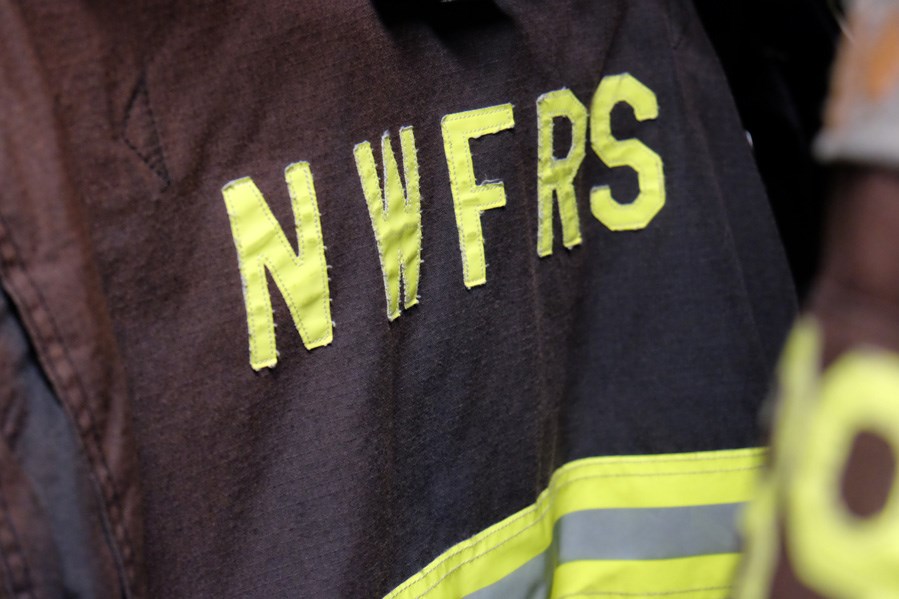New Westminster firefighters are working under an up-to-date collective agreement for the first time in years.
The City of New Westminster has reached a new collective agreement with Local 256 of the International Association of Firefighters. The collective agreement, ratified on Dec. 2, is retroactive to Jan. 1, 2012 and expires in 2019.
The seven-year deal includes a 2.5 per cent annual wage increase for each year of the contract.
“We were three years without an agreement. The previous agreement had expired Dec. 31, 2011,” said firefighter Bill Shokar, acting president of Local 256. “It was business as usual. For whatever reason, we have been playing catch-up as far as agreements go.”
Fire Chief Tim Armstrong said the new agreement comes a year after the city and the union settled a contract dating back to 2009 and 2010.
“I think it’s good for everybody,” Armstrong told The Record. “The membership is going to benefit from it. I think the employer benefits from it.”
Along with pay increases, he said the “operational efficiencies” will benefit both sides and a long-term agreement is good for morale.
“As far as the city’s strategy, they put a contingency away,” Armstrong said. “They never know what (the settlement's) going to be but there’s always a contingency for wage increases that they bank on so it’s not a huge hit to the budget.”
Gary Holowatiuk, the city’s director of finance, said the city has been budgeting for an increase since 2012. He said the increase is “slightly higher than what was budgeted so there will be an adjustment in the upcoming budget to address this.”
Shokar said it’s a “positive step” for firefighters to have negotiated a longer-term agreement without the need for any third-party assistance. He said it’s in line with agreements being reached in fire departments in the region.
“We had been in talks for several months. The roll-up-the-sleeves type of negotiating began in November of 2014,” he said. “Once we sat down with our various proposals and sat face-to-face there was only four sessions. That’s all it took.”
Shokar said about 62 per cent of the membership who voted at the ratification meeting supported the collective agreement. The union recommended approval.
“Part of what this contract has is significant restructuring of the department of our membership and how they are deployed,” he said. “That was an issue that members felt strongly about. There was an appetite from the employer to, not necessarily a cost savings for them, but they wanted to restructure our departments to eliminate the assistant chiefs position. It did go through.”
According to Shokar, there are lots of details to be worked through regarding the changes being made to the department.
“As with every other change, I think our membership is pretty positive and takes a little time to adjust to the change, but will embrace it and move ahead,” he said.
Armstrong said the fire department was able to get more flexibility with some of its staffing positions, including more opportunities for firefighters to move between the fire prevention and suppression divisions (to minimize the need for overtime) and the continuation of the fire prevention task force that was established after last year’s massive apartment fire on Ash Street.
One of the more controversial aspects of the new deal is the reclassification of firefighters who have been classified as assistant chiefs (also known as battalion chiefs).
“We said, ‘this isn’t working. You guys obviously don’t embrace the administration side of the house but you do embrace the emergency response side of the house. So, why don’t we eliminate that position, amortize it all over the whole organization and we will create a senior captain’s position, which is basically the same as the assistant chief’s position, just at a lower rate of pay,’” Armstrong said. “We were able to negotiate a cost-neutral deal.”
According to Armstrong, the pay structure will take effect as the assistant chiefs retire. The new senior captains will be on a higher pay scale than regular captains.
“Nobody is being demoted,” he said. “We red-circled the guys that are currently in those positions.”
Armstrong said the city has offered to create a committee that includes union representation to look at some of the changes to the department and get input so there’s better buy-in from the membership.
“I find the longer I have done this, most problems are misperception. People get twisted before they really have all the facts,” he said. “By having a process to talk about it and be able to react to problems without creating conflict makes it a lot easier for everybody.”



